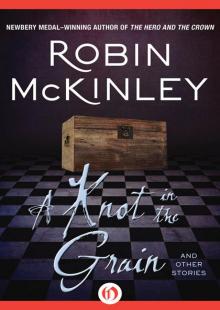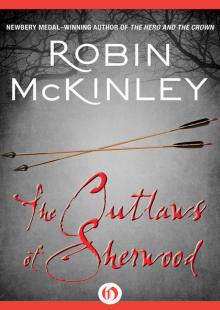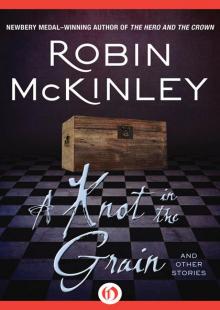- Home
- Robin McKinley
Water Page 2
Water Read online
Page 2
“They made signs to her, which she did not understand, but supposed them to be trying to comfort her, so she signed to them that she wished to return to her own people, but they in their turn frowned and shook their heads, until she went to the place where the shining fish was trapped and started to take down the wall they had built. They stopped her, angrily, but she pointed to the fish as it sought to escape through the gap she had made, and then at herself, and at the walls that held her, and made swimming motions with her arms, though she could not swim. They looked at each other, more troubled than before, and argued for a while in their own language, the one trying to persuade the other, though she could see that both were afraid. In the end they left her.
“She sat a long while, waiting, until there was a stirring in the water that told her that some large creature was moving below the surface. She backed away as it broke into the air. It was a man, a huge, pale man of the sea-people. If he had had legs to walk upon, he would have stood as tall as two grown men. She could feel the man’s anger as he gazed at her, but she said the Lord’s Prayer in her mind and with her palms together walked down to the water’s edge and stood before him, waiting to see what he would do.
“Still he stared, furious and cold. She thought to herself and closed her lips and started to hum the music the sea-children had taught her, until he put up his hand and stopped her. He spoke a few words of command and left.
“She waited. Twice he came back, bringing stuff from the wreck, spars and canvas and rope, which he then worked on, in and out of the water, making what seemed to be a kind of tent which he held clear of the water and then dragged back in, with air caught inside it, so that it floated high. He then buoyed it down with boulders to drag it under. He took it away and came back and worked on it some more, and then returned, having, she supposed, tried it out and been satisfied. Meanwhile she had gathered up her own clothes and wrapped them tightly in oilskin, and stripped off the ones she was wearing, down to the slip, and tied her bundle to her waist.
“When he was ready, the man, being unwilling himself to come ashore, signalled to her to break down the wall that held the shining fish, which she did, and it swam gladly away. So in utter darkness she walked down into the water, where the man lifted his tent over her and placed her hands upon a spar that he had lashed across it for her to hold and towed her away, with her head still in the air that he had caught within the canvas and her body trailing in the water. She felt the structure jar and scrape as he towed it through the opening and out into the sea. By the time they broke the surface, the air had leaked almost away, but he lifted the tent from her and she looked around and saw that it was night.
“The storm was over, and the sea was smooth, with stars above, and a glimmer of dawn out over the ocean. Charity lay along the sea-man’s back with her arms around his shoulders as he swam south and set her down at last in the shallows of a beach. Oyster Beach we call it now.
“She waded ashore, but turned knee-deep in the water to thank him. He cut her short, putting the flat of his hand against his lips and making a fierce sideways gesture with his other hand—so—then pointed at her, still as angry-seeming as when she had first seen him. She put her palms crosswise over her mouth, sealing it shut, trying to say to him: Yes, I will keep silent. She had already known she must. She did not know if any of the People were left alive after the storm, but they were the only folk she knew, and who of them would believe her, and not think she was either mad or else talking profane wickedness? Then she bowed low before him, and when she looked up, he was gone.
“She took off the slip she had worn in the sea and left it at the water’s edge, as though the tide had washed it there. Then she dressed herself in her own clothes, dank and mildewy though they were, and walked up the shore. Inland was all dense woods, so she walked along beside them, past Watch Point to Huxholme Bay, where three men met her, coming to look for clams at the low tide.
“So. That is the story of Charity Goodrich. Tomorrow you shall tell it to me, leaving nothing out, so that I can be sure you know it to tell it truly to your own daughters when they are old enough to understand.”
Probity sat by Mercy’s bed throughout the night she died, holding both her hands in his. They prayed together, and from time to time they spoke of other things, but in voices too soft for Pitiable, in her cot at the top of the ladder, to hear. In the end she slept, and when she came down before dawn to remake the fire, she found Probity still in his clothes, sitting by the fire with his head between his hands, and Mercy stretched out cold on her cot with her Bible on her chest. For two days Probity would not eat or dress or undress or go to bed. He let the Church Elders make the arrangements for the funeral, simply grunting assent to anything that was said to him, but for the ceremony itself he pulled himself together and shaved carefully and polished his belt and boots and dressed in his Sunday suit and stood erect and stern by the graveside with his hand upon Pitiable’s shoulder, and then waited with her at the churchyard gate to receive the condolences of the People.
Mercy in her last hours must have spoken to him about their granddaughter, and told him to take comfort in her and give her comfort in return, and this he tried to do. He read the Bible with her in the evenings, and sometimes noticed if she seemed tired and told her to rest. And around Christmas, when all the children of the townspeople were given toys, he whittled a tiny horse and cart for her to set upon the mantel-shelf. By day he worked as he always had to see that the two of them were warm and fed, fetching in the stacked logs for the stove, and bringing in more from the frozen woods to make next season’s stack, and digging turnips and other roots from the mounds where they were stored, and fetching out grain from the bins and salted meat from the barrels, and mending the tools he would need for next summer’s toil, while Pitiable cooked and stitched and cleaned as best she could, the way Mercy had shown her. She was young for such work, and he did not often scold her for her mistakes. So the neighbours, who at first had felt that in Christian duty they must keep an eye upon the pair, decided that all was well and left them alone.
Spring came with the usual mud and mess, followed by the urgent seed-time when the ground dried to a fine soft tilth and had not yet begun to parch. It was then that Probity, after brooding for a while, went to the Elders of the People and asked for their permission to bring his daughter’s body up from the town cemetery and bury it beside Mercy’s in the graveyard of the People. The Elders did not debate the question long. They were all of one grim mind. Obedience Hooke had cut herself off from the People by marrying the out-warder, Simon Nasmith. When the Lord came again in Glory, he would raise the bodies of His faithful People from their graveyard to eternal life, but Obedience Hooke had by her own act cast herself into damnation and would not be among them.
Probity sowed his crops as usual, but then, as June hardened into its steady, dreary heat, he seemed to lose heart. The leafy summer crops came quick and easy, and there was always a glut of them, but the slow-grown roots and pulses that would be harvested later, and then dried or salted or earthed into clamps, were another matter. He did not hoe them enough, and watered irregularly, so that the plants had no root-depth and half of them wilted or wasted. He neglected, too, to do the rounds of his fences, so that the sheep broke out and he had to search the hills for them, and lost three good ewes.
Pitiable was aware that the stores were barely half-filled, but said nothing. Probity was her grandfather, her only protector, and absolute master in his own house. He did what he chose, and the choice was right because it was his.
September brought a great crop of apples from the two old trees. Mercy had always bottled them into sealed jars, but that was a skill that had to be done just right, and Pitiable did not know how. Probity could well have asked a neighbour to teach her, but he was too proud, so he told her to let them fall and he would make cider of them. Most of the People made a little cider, keeping it for special days, but this year Probity made a lot, using casks he would not now need for storage as he had less to store. He shook himself out of his dull mood and took trouble so that the cider brewed strong and clear. He took to drinking a tankard of it with his supper, and became more cheerful in the evenings.
Winter came, with its iron frosts, and Probity started to drink cider with his dinner, to keep the cold out, he said. And then with his breakfast, to get the blood moving on the icy mornings. By the time the sunrise turned back along the horizon, he was seldom without a tankard nearby, from the hour he rose until the hour at which he fell snorting, and still in his day clothes, onto his bed.
He began to beat Pitiable, using his belt, finding some fault and punishing her for it, though both of them knew that that was not the cause. He was hurt to the heart, and sick with his own hurt, and all he could think of was to hurt someone or something else, and doing so himself to hurt himself worse, dulling the pain with new pain. One night Pitiable watched as he took the horse and cart he had made her and broke them into splinters with his strong hands and dropped them into the fire.
Pitiable did not complain or ask anyone for help. She knew that anything that happened to her was a just punishment for her having been born. Her mother and father should never have wed. By doing so they had broken God’s law. And then Obedience, Probity’s lovely lost daughter, had died giving birth to Pitiable. So Pitiable was both the fruit of her parents’ sin and the cause of her mother’s death, and of Probity’s dreadful hurt. Nothing that was done to her could be undeserved.
On Sunday mornings Probity did not drink. He shaved and dressed with care and took Pitiable to church. They made an impressive pair, the big, gaunt man and the pale and silent child. Neighbours remarked how much they meant to each other, now Mercy was gone. Once a woman asked Pitiable why she wept in
church, and Pitiable replied that it was because of her grandmother dying. The woman clucked and said that she was a good little girl—how could she have known that Pitiable had been weeping with the pain of having to sit still on the hard bench after last night’s beating?
They came through the winter, barely, scraping out the old and mouldy stores from the year before. Probity butchered and salted one of his ewes, saying she was too old for bearing, which was not true. So they did not quite starve.
The mush of spring dried to the blaze of summer, and Probity pulled himself together and drank less and worked in his fields and brought home food and kept his belt around his waist, but he did almost nothing to provide for the coming winter. One noon in the late summer heat wave, Pitiable went out to tell him that his dinner was on the table and found him at the door of his store shed, staring into its emptiness, as if lost in a dream. He started when she spoke and swung on her, and snarled, “The Lord will provide.” That evening he undid his belt and beat her for no reason at all.
From then on he was as harsh as he had been last winter, but at the same time strangely possessive. He seemed unable to bear to let her out of his sight. Having no harvest to gather, he took to wandering along the shore, in the manner of the truly poor and shiftless townspeople, looking for scraps of the sea’s leavings, driftwood and such, which he might use or sell. Almost at once he was lucky, finding a cask of good sweet raisins, unspoilt, which he sold well in the town. After that he would go almost every day, taking Pitiable with him to help search and carry, but the quiet days of the heat wave brought little to land.
That dense stillness broke, as usual, with a week of storm. There was a proverb in the town, “The hotter burns the sun, the wilder blows the wind,” and so it proved that year, with gales that brought down trees and chimneys and stripped roofs and scattered haystacks, while day and night huge rollers thundered against the shore. On the ninth night the storm blew itself out and was followed by a dawn of pearly calm.
Probity was up before sunrise and gulped his breakfast and pulled on his boots and told Pitiable to leave the dishes unwashed and the hearth unlaid.
“The Lord spoke to me in the night,” he said. “We must be first down on the shore, for this is the day on which He will provide.”
The town was barely stirring as they hurried towards the harbour, and left up Northgate to the beaches. On Home Beach there were men about, seeing to their boats, many of which, though drawn well up above the tide-lines, had been tossed about by the storm, overturned, piled together or washed inland. Probity hurried past, and on over Shag Point to Huxholme Bay, which was steep small shingle. Here they stopped to search. The waves had brought in a mass of new stuff, piles of wrack and driftwood, tangles of half-rotted cording, torn nets, broken casks and crates, as well as sea-things, shells and jellyfish and small squid and so on. Probity had a piece of chalk with which to mark anything he wanted to collect on his way back, but he was not looking for timber or firewood to-day and marked nothing.
Next came Watch Point, both sandy and rocky. Here Pitiable picked out of the sand an ancient leather boot with a spur, which Probity tested with his jack knife to see if it might be silver. It was not, but he put it in his sack and poked around with his staff in the sand, in case it might be part of some buried hoard exposed by the storm, but again it was not.
Beyond Oyster Bay lay the Scaurs, two miles of tilted rocky promontories with inlets between, like the teeth of a broken comb, and beyond them black unscalable cliffs. The Scaurs were the best hunting ground, but slow work, full of crannies and fissures where trove might lodge. If Pitiable had been less sore from last night’s beating—lengthy and savage after Probity had been nine days cooped up by the storm—she might have enjoyed the search, the jumping and scrambling, and the bright sea-things that lurked in the countless pools. As it was, she searched numbly, dutifully, her mind filled with the dread of their homecoming, having found nothing. That failure would be made her fault, reason enough for another beating.
She searched the upper half of the beach and Probity the lower. They were about half way to the cliffs, and could already hear the screaming of the tens of thousands of gulls that nested there, when her way was blocked by the next jut of rock, a vertical wall too high for her to climb. She was hesitating to go shoreward or seaward to get past the barrier when she heard a new noise, a quick rush of water followed by a slithering, a mewling cry and a splash. After a short while the sounds were repeated in the same order. And again. And again.
They seemed to come from beyond the barrier to her right, so she turned left, looking for a place where she could climb and peer over without whatever was making them becoming aware of her. She came to a pile of rocks she could scramble up. The top of the barrier was rough but level. Crouching, she crept towards the sea and discovered a large, deep pool, formed by the main rock splitting apart and then becoming blocked at the seaward end by an immense slab, trapping into the cleft any wave that might be thrown that far up the shore. The seal at the top end wasn’t perfect, and enough water had drained away for the surface to be several feet down from the rim, leaving a pool about as wide as one of the fishing boats and twice as long, or more.
As Pitiable watched, the surface at the seaward end of the pool convulsed and something shot up in a burst of foam. She saw a dark head, a smooth, pale body, and a threshing silvery tail that drove the creature up the steep slope of the slab that held the pool in. A slim arm—not a leg or flipper but an arm like Pitiable’s own—reached and clutched, uselessly, well short of the rim, and then the thing slithered back with its thin despairing wail and splashed into the water. From what Mercy had told her of Charity Goodrich’s adventure, Pitiable understood at once what she had seen.
Amazed out of her numbness, she watched the creature try once more, and again, before she silently backed away and looked down the shore for her grandfather. He was standing near the water’s edge but gazing landward, looking for her, she guessed. She waved to him to come and he hurried towards her. She held her finger to her lips and made urgent gestures for silence with her other hand. By now he must have heard the sounds and understood that something living was concerned, which must not be alarmed, so he made his way round and climbed cautiously up the same way that she had. She pointed and he crept forward to peer into the pool.
She lost count of the cries and splashes while he stared, but when at length he backed away and turned she saw that his eyes were glistening with a new, excited light. He climbed down, helped her to follow, chalked his mark onto the rock and led her up the beach.
“The Lord has indeed provided,” he whispered. “Blessed be His name. Now you must stand guard while I fetch nets and men to bring this thing home. If anyone comes, you must tell them that the find is mine. See how excellent are His ways! This very week He brings the fair to town! Stay here. Do not go back up the rock. It must not see you.”
He strode off, walking like a younger man, picking his way easily across the broken rocks. Pitiable sat on a sea-worn slab and waited. She felt none of Probity’s excitement. She was now appalled at what she had done. Probity and his helpers would catch the sea-child and sell her—from what she had seen, Pitiable was almost sure it was a girl—sell her to the showmen at the fair. That in itself was dreadful. The People had no dealings with the fair that came each autumn. It was an occasion of frivolity and wickedness, they said. But now Probity was going to take the sea-child to them and haggle for a price. More than anything else, more than the ruined farm, more even than her own beatings, this made Pitiable see how much he had changed.
Obediently she sat and watched him go. When he came to Oyster Bay, he turned back, shading his eyes, so she stood and waved and he waved back and vanished into the dip, leaving her alone with the sea and the shore and the strange, sad cries from the pool. By now Pitiable was again too wrapped in her own misery to hear them as anything more than cries, as meaningless to her as the calling of the gulls. It struck her perhaps that Probity would perhaps not sell the sea-girl, but would join the fair, taking Pitiable with him, and show her himself. She would be dead by then, of course—in Charity Goodrich’s story the sea-people could not live long out of water—but people would pay money to see even a dead sea-child.

 Spindle's End
Spindle's End The Door in the Hedge: And Other Stories
The Door in the Hedge: And Other Stories The Blue Sword
The Blue Sword Rose Daughter
Rose Daughter A Knot in the Grain and Other Stories
A Knot in the Grain and Other Stories The Hero And The Crown
The Hero And The Crown Deerskin
Deerskin Sunshine
Sunshine Beauty: A Retelling of the Story of Beauty and the Beast
Beauty: A Retelling of the Story of Beauty and the Beast Shadows
Shadows Pegasus
Pegasus Chalice
Chalice The Outlaws of Sherwood
The Outlaws of Sherwood Fire: Tales of Elemental Spirits
Fire: Tales of Elemental Spirits Beauty
Beauty Dragon Haven
Dragon Haven The Hero And The Crown d-2
The Hero And The Crown d-2 A Knot in the Grain
A Knot in the Grain The Blue Sword d-1
The Blue Sword d-1 Beauty (v1.2)
Beauty (v1.2) The Door in the Hedge
The Door in the Hedge